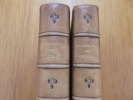HOMERUS,
Ilias & Odyssea
Edidit G. Beaumlein. 1854. Deux exemplaires en grec ancien. Tome 1:518pp.; Tome 2: 436pp. Reliure demi dos aux coins avec beaux fers au dos. In-16°.
Reference : LITT3131M
Très bon état. Bel édition des épopées grecs. Intérieur très frais et agréable. Minuscules marques d'âge.
Bookseller's contact details
Librairie du Levant
M. Yannick RENAUD
15 rue Marengo
64100 Bayonne
France
+33 5 59 03 69 40
Payment mode




Sale conditions
We accept payments in € by bank transfers, remote Credit Card, Paypal or checks. Checks made payable to and addressed to: Librairie du Levant 15 rue Marengo 64100 Bayonne France Bank transfers to: Banque Courtois, 1 pl du Réduit 64100 Bayonne / RIB / 10268 02696 62711600200 13 / IBAN / FR76 1026 8026 9662 7116 0020 013 / SWIFT BIC / COURFR2T PAYPAL via the address: librairiedulevant@orange.fr For any remote payment by Credit Card, informations communicated are automatically deleted as soon as payment is made and validated. Shipping upon receipt of payment. Member of the Syndicat des Libraires Anciens et Modernes (SLAM) and of the International League of Antiquarian Booksellers (ILAB), our sales are made according to the customs of the profession. All our books and objetcs are guaranteed to conform to the description which appears in each sheet; if, as a result of an error or an oversight, this was not the case, order will be taken back (within fifteen days) and reimbursed (including the costs of redirection), provided that it is returned in the same condition as the purchase. For obvious technical reasons (format, colors, cropping, viewing angle, etc.), the photographs presented on this site are not contractual. Our prices are in Euros, packaging included. Shipments, made under the responsibility of the buyers, are made by Colissimo Post, registered with insured value from € 50 and up to € 5,000 (delivery against signature, package tracking and insured value); for works less than 50 €, shipments are made by registered letter; works whose value exceeds € 5,000 must be sent by special carrier with insured value and delivery against signature. For any shipment outside mainland France, shipping and insurance costs remain the responsibility of the customer. Shipments are made under the same conditions set out above. Possibility to collect the orders on site. Do not hesitate to keep up to date with our news, finds, curiosities, catalogs and various thematic lists by leaving your contact details by email at librairiedulevant@orange.fr
5 book(s) with the same title
HOMERI ILIAS & ODYSSEA, et in easdem scholia sive interpretatio Didymi. Cum Latina versione accuratissima, Indiceque Græco locupletissimo Rerum ac variantium lection. Accurante Corn. Schrevelio. « Homère est l’énorme poète enfant. Le monde naît, Homère chante. C’est l’oiseau de cette aurore. Homère a la candeur sacrée du matin. Il ignore presque l’ombre… Homère est un des génies qui résolvent ce beau problème de l’art, le plus beau de tous peut-être, la peinture vraie de l’humanité obtenue par le grandissement de l’homme, c’est-à dire la génération du réel dans l’idéal. Fable et histoire, hypothèse et tradition, chimère et science, composent Homère. Il est sans fond, et il est riant. Toutes les profondeurs des vieux âges se meuvent, radieusement éclairées, dans le vaste azur de cet esprit. » Victor Hugo.
Le somptueux exemplaire du baron de Longepierre (1659-1721) relié à l’époque par Boyet en maroquin bleu doublé de maroquin rouge. Amstelodami, ex Officina Elzeviriana, Anno 1656. 2 volumes in-4. T.I: (8) ff. y compr. le titre gravé, 716 pp., T. II(daté 1655): 536 pp., (22) ff. d’index. Maroquin bleu, emblème de la Toison d’or aux angles, au centre et quatre fois répétée aux dos, doublures de maroquin rouge, dentelle intérieure dorée, toison dorée au centre, tranches dorées sur marbrures. Reliure de Boyet, actif sous le règne de Louis XIV. 235 x 167 mm.
«Belle édition, dont le texte est formé sur ceux de Turnière et d’Estienne.» Brunet III, colonne 272. Edition en grec, accompagnée de la traduction latine. « Le plus grand fait de la civilisation grecque reste toujours ceci, qu’Homère devint de si bonne heure panhellénique. Toute la liberté intellectuelle et humaine où parvinrent les Grecs revient à ce fait… De temps en temps s’éleva du fond le plus intime de l’hellénisme une protestation contre Homère; mais il resta toujours vainqueur. Toutes les grandes puissances spirituelles exercent à côté de leur action libératrice, une autre action déprimante; mais, à la vérité, cela fait une différence que ce soit Homère ou la Bible ou la Science qui tyrannise les hommes !» Nietzsche. «Inscrivez en tête d’un papier le nom d’Homère. C’est le plus grand nom, mon enfant. Les dieux ne seraient rien, et non seulement les dieux, mais les hommes, s’il ne les avait pas chantés… Rien n’est aussi pur qu’Homère… C’est le plus grand. C’est le plus vieux. C’est le patron. C’est le père. Il est le maître de tout. Et notamment il est le maître de tout ce qu’il y a jamais eu de plus grand dans le monde, qui est le familier.» Charles Péguy. Merveilleux exemplaire relié spécialement par Boyet pour Hilaire-Bernard de Roqueleyne, Baron de Longepierre, « Longepierre (1659-1721) se distingua tellement de ses condisciples, dans ses études classiques, que Baillet le plaça parmi les Enfants célèbres. Il composa, comme on le sait, plusieurs tragédies qui toutes, à l’exception de sa ‘Médée’, eurent une fin tragique. Le succès de sa ‘Médée’ fit qu’il ne voulut d’autres signes héraldiques sur ses livres que la Toison d’Or. L’amour des livres contribua peut-être plus à sa notoriété que ses pièces de théâtre. L’auteur dramatique est presque oublié aujourd’hui, tandis que le bibliophile est resté en grande réputation parmi les amateurs.» (J. Guigard. Nouvel armorial du Bibliophile. Paris, 1890). Cet exemplaire fut vendu 200000 FF (30500 €) le 5 juin 1988, il y a 34 ans (Ref. Livres précieux, n°83). Ex-libris manuscrit ancien sur le titre et ex-libris gravé au verso de C.L. Robert Jardel.
Homeri quae exstant omnia. Ilias, Odyssea, Batrachomyomachia, Hymni, poëmatia aliquot cum latina versione omnium quae circumferuntur emendatiss. Aliquot locis iam castigatiore perpetuis item iustisqŽue in Iliada simul & Odysseam Io. Spondani Mauleonensis commentariis. Pindari quinetiam Thebani Epitome Iliados Latinis versib. & Daretis Phrygij de bello Troiano libri, à Corn. Nepote eleganter latino versi carmine.
Basileae, per Sebastianum Hericpetri, 1606. Fort in-4°, [18 ff dont titre avec bois gravé]-427 pp.- colonnes 428 à 499 (complet)-[12 ff.], [2 ff. dont titre intermédiaire]-380 pp.-[12 ff], Bandeaux, lettrines et culs-de-lampes, intérieur frais (mouillure marginale sans gravité en coin et tête du dernier quart du volume, qqs ff. unif. Brunis, rares petits trous de vers en marge, une petite dizaine dannotations et corrections de lépoque à la plume dans les marges essentiellement, dont qqs corrections du texte grec, ATTENTION : les pp. 88 et 93 de la seconde partie sont restées blanches et manquent donc à notre exemplaire). Reliure restaurée, dos en basane beige, plats de vélin sur ais de bois conservés estampés à froid avec deux médaillons centraux différents aux plats sup. et inf. "Fermoirs" en lanière de vélin. Reliure solide.
Malgré les 2 pages manquantes, et la reliure restaurée, lexemplaire reste agréable et solide. Il sagit dune édition composite de lédition bilingue grec ancien - latin des uvres dHomère, accompagnée des commentaires de Jean de Sponde (15571595).Le premier volume comprend, en plus du titre, les dédicaces à Henri III et Henri IV, les Prolegomena, les Epigrammata Palaia Diaphoron et lIliade, avec Epitome, De bello Troiano et lindex correspondant. Le second volume contient la lOdyssée, avec la préface de Sponde, la Batrachomyomachia, les Hymnes, les Épigrammes, ainsi que lindex de lOdyssée. Le dernier feuillet est orné du bois gravé de limprimeur Henric Petri.
Ilias Graece et Latine.. Ex recensione et cum notis Samuelis Clarke. Editio decima sexta [Avec :] Odyssea Graece et Latine. Edidit, annotationesque, ex notis nonnullis manuscriptis a Samuele Clarke relictis, partim collectas, adjecit Samuel Clarke. Editio quinta
Londres, J. Cuthell, J. Nunn, Lackington, Robert Scholey, G. Cowie, P. Wright, Edimbourg, Bell & Bradfute, P. Hill, Laing, Doig & Stirling, J. Fairbairn, York, Wilson, 1815 2 titres en 4 vol. in-8, IV-508, IV-521, [2]-484 et [2]-400 pp., avec deux cartes dépliantes, index, demi-maroquin vieux rouge à coins, dos à larges nerfs ornés de hachurés, filets et guirlandes dorés (Thouvenin-Jeune). Rousseurs, mais bel exemplaire.
Une des très nombreuses rééditions de la fameuse édition donnée par le théologien Samuel Clarke (1675-1729) en 1729-32 (pour l'Iliade), et en 1740 (pour l'Odyssée, procurée par son fils de manière posthume). Brunet III, 273-274. - - VENTE PAR CORRESPONDANCE UNIQUEMENT - LIEN DE PAIEMENT, NOUS CONSULTER.
Odyssea. (und) Ilias. Eiusdem Batrachomyomachia, Hymni, aliaq; eius opuscula, seu catalecta. Omnia Graecè & Latinè edita quàm emendatissimè. Cum Praefatione, Scholijs, & Indice. D. Giphanij.
2 Bände. Straßburg, Theodosius Rihl, 1572. 8°. 827 (1) S., (26) Bl.; 891 (1) S., (36) Bl. Mit 2 Titelholzschnittvignetten. Pergamenteinbände der Zeit.
VD 16 ZV 22787 und VD16 ZV 26627. – Mit altem handschr. Besitzereintrag auf dem fliegenden Vorsatz. Mit Gebrauchsspuren. Pergamentbezüge fleckig. Papier nur vereinzelt stockelfleckig.
 Write to the booksellers
Write to the booksellers






